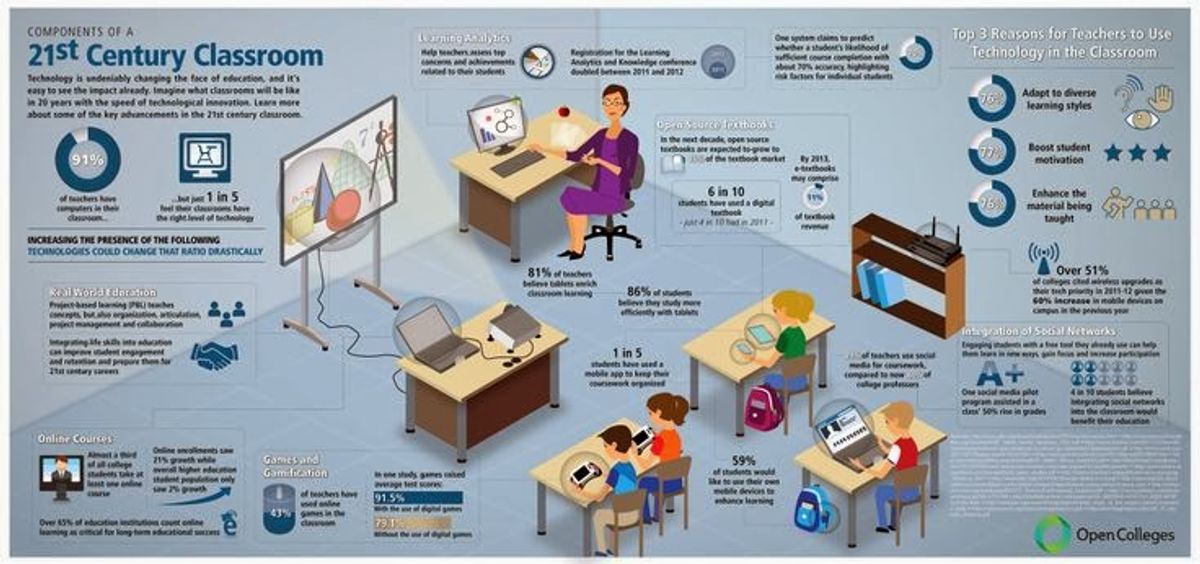Artificial Intelligence (AI) is revolutionizing the realm of online education by providing personalized learning experiences that were once thought impossible. Through the integration of sophisticated algorithms and data analysis, AI is enabling online education platforms to tailor learning to the individual needs of students. This article delves into the various ways AI is enhancing personalized learning, from creating adaptive learning pathways to offering real-time feedback, and discusses both the opportunities and challenges this technology presents in the educational landscape.
Key Takeaways
- AI enables the creation of adaptive learning pathways that adjust to students' individual learning pace and style, leading to more effective education.
- Real-time feedback and support powered by AI can significantly improve the learning process by providing instant assistance and personalized guidance.
- The use of data-driven insights allows educators to engage students more effectively, predict learning outcomes, and offer targeted interventions.
- AI-powered tutoring and mentorship programs offer personalized instruction and career advice, making high-quality education more accessible.
- While AI presents numerous opportunities for enhancing online education, it also raises important challenges and ethical considerations regarding privacy, bias, and maintaining the human element in learning.
Tailoring Learning Experiences with AI

Adaptive Learning Pathways
Adaptive learning pathways are revolutionizing the way students engage with online education. AI Adaptive Learning Software enables a highly personalized approach, adjusting the curriculum in real-time to suit the individual's pace and understanding. This dynamic adjustment ensures that each student can learn at their optimal speed, maximizing their potential for success.
- Initial Assessment: Determines the student's current knowledge level.
- Ongoing Analysis: Continually assesses performance and learning style.
- Tailored Content: Presents material that matches the learner's needs.
- Feedback Loops: Provides immediate feedback to guide progress.
By leveraging AI, online platforms can create a unique educational journey for every learner, ensuring that no student is left behind due to a one-size-fits-all curriculum. The software's ability to analyze vast amounts of data allows for the identification of patterns and learning gaps, which can then be addressed with customized content and support.
Real-Time Feedback and Support
In the realm of online education, real-time feedback and support stand out as pivotal elements in enhancing the learning experience. AI systems are uniquely equipped to provide immediate responses to student inquiries and assessments, a feature that traditional classroom settings struggle to match. This immediacy not only helps in keeping students engaged but also allows for quick course corrections, preventing the accumulation of misunderstandings.
- Immediate assessment: AI can evaluate responses as soon as they are submitted, providing instant feedback.
- Personalized hints: Based on the student's performance, AI can offer tailored hints to guide them towards the correct answer.
- Progress tracking: Students can see their progress in real-time, which helps in maintaining motivation.
The integration of AI into online platforms transforms the feedback loop from a periodic to a continuous process, enabling a more dynamic and responsive learning environment.
The benefits of such a system are manifold, including diverse methods of learning, customized educational journeys, and the scalability to support a large number of students simultaneously. By leveraging AI for real-time feedback, online education platforms can significantly enhance the effectiveness of the learning process.
Customized Content Delivery
In the realm of online education, customized content delivery stands out as a pivotal feature enabled by AI. By analyzing individual learning styles and performance data, AI systems can tailor the educational material to suit each student's unique needs. This personalization ensures that learners are neither overwhelmed by difficulty nor bored by simplicity, maintaining an optimal learning curve.
- Adaptation to Learning Styles: AI can identify whether a student is a visual, auditory, or kinesthetic learner and adjust the content accordingly.
- Pacing: Content can be paced to match the learner's speed, providing more time for complex topics and accelerating through familiar material.
- Difficulty Adjustment: Exercises and quizzes are dynamically adjusted in difficulty based on the student's performance.
The integration of AI into content delivery systems is not just about personalization but also about fostering a sense of community among learners. No-code AI platforms can create vibrant online communities where students from different geographical locations can connect, share ideas, and work on projects together.
While AI-driven content delivery is transformative, it is essential to continuously refine these systems to ensure they remain effective and accessible to all learners, regardless of their background or skill level.
Data-Driven Insights for Student Engagement

Predictive Analytics for Learning Outcomes
Predictive analytics harness the power of data to forecast individual student performance, enabling educators to tailor interventions and support proactively. By analyzing patterns from past and current learners, AI can identify which students may need additional help and in what areas, before they fall behind.
- Identification of at-risk students
- Recommendations for optimal learning paths
- Alerts for timely educator intervention
Predictive models are not just about foreseeing challenges; they're also about recognizing and nurturing potential, ensuring every learner has the opportunity to excel.
The use of predictive analytics extends beyond academic support. It can guide curriculum development, inform resource allocation, and even shape policy decisions. By leveraging these insights, online education platforms can create a more dynamic and responsive learning environment.
Behavioral Data and Personalized Interventions
Online education platforms are increasingly utilizing behavioral data to offer personalized interventions that cater to individual student needs. By analyzing patterns in student engagement, such as time spent on tasks and frequency of logins, educators can pinpoint areas where learners may require additional support.
For instance, a student consistently struggling with math problems may receive tailored practice sets that focus on their weak points. Similarly, if a learner is frequently accessing resources late at night, the platform might suggest a time management plan to help balance their study habits.
Personalized interventions are not just about academic support; they also encompass the overall well-being of the student, ensuring a holistic approach to education.
The table below illustrates how data analytics can inform intervention strategies:
By leveraging insights from data analytics, educators can provide targeted interventions that are more likely to result in improved learning outcomes and student satisfaction.
Enhancing Motivation through Gamification
Online education platforms are increasingly leveraging gamification to boost student engagement and motivation. By incorporating game-like elements such as points, badges, and leaderboards, learners are encouraged to set goals and achieve them in a playful yet productive environment. This approach taps into the competitive spirit and the desire for achievement, making the learning process more enjoyable and immersive.
- Points for completing modules
- Badges for mastering skills
- Leaderboards to encourage competition
Gamification not only makes the learning experience more interactive but also provides a sense of progress and accomplishment. Students are more likely to engage with the material and retain information when they feel they are working towards a tangible goal. Moreover, the immediate rewards and recognition that come with gamification can enhance student intrinsic motivation and alter perceptions of learning.
The integration of game elements and learning activities into gamified learning can potentially increase students' intrinsic motivation by making learning experiences more dynamic and personalized.
AI-Powered Tutoring and Mentorship

Intelligent Tutoring Systems
Intelligent Tutoring Systems (ITS) represent a significant leap in personalized education, leveraging AI to provide students with one-on-one instruction tailored to their learning pace and style. These systems adapt in real-time to the learner's responses, ensuring that each student receives the attention and resources they need to master the subject matter.
- ITS can identify individual strengths and weaknesses.
- They provide personalized feedback and hints.
- They create a dynamic learning path for each student.
ITS are not just about delivering content; they're about understanding the learner and creating an interactive learning environment that mimics the benefits of a personal tutor.
The effectiveness of ITS is often measured by their impact on learning outcomes and student satisfaction. While the data is promising, continuous research and development are essential to refine these systems for broader application and accessibility.
Virtual Mentors and Career Guidance
Online education platforms are increasingly leveraging AI to provide virtual mentors and career guidance, offering personalized advice and support that aligns with individual career aspirations. These AI mentors can analyze a student's performance, interests, and goals to suggest tailored career paths and educational resources. AI-driven career guidance systems like ODICY (Observatory on Digital technologies in Career guidance for Youth) exemplify this trend, emphasizing the importance of learning from each other to better prepare for the workforce.
The benefits of virtual mentors are numerous:
- They provide 24/7 availability, removing the constraints of traditional office hours.
- They offer a judgment-free zone for students to explore various career options.
- They can connect students with professional networks and resources.
Virtual mentors are not just a futuristic concept; they are a present-day reality that can significantly enhance the career planning process for students in online education platforms.
Peer Learning Facilitated by AI
The integration of AI into online education platforms has revolutionized the way students interact and learn from one another. AI-driven systems can analyze communication patterns and suggest groups where students can optimally collaborate, based on their learning styles and knowledge levels.
- AI monitors student discussions and identifies key topics and questions.
- It suggests relevant resources to facilitate deeper understanding.
- AI connects students with complementary skills for project-based learning.
By leveraging AI, online platforms can create dynamic peer learning environments that adapt to the needs of students, fostering a community of collaborative and engaged learners.
These intelligent systems not only enhance the quality of discussions but also ensure that every student can find a peer group that resonates with their educational journey. The goal is to create a supportive network that mirrors the collaborative learning experiences found in traditional classroom settings.
Challenges and Ethical Considerations

Privacy and Data Security Concerns
In the realm of online education, the integration of AI brings to the forefront significant privacy and data security concerns. As educational platforms collect and process vast amounts of personal information, the risk of data breaches and unauthorized access increases. It is crucial for providers to implement robust security measures to protect sensitive student data.
- Establish strong encryption protocols
- Regularly update and patch systems
- Conduct frequent security audits
- Provide training on data privacy for staff and students
Ensuring the safety of personal information within AI-driven educational tools is not just a technical challenge, but a fundamental aspect of maintaining trust and integrity in the learning environment.
The strategies to protect data, prevent malware, and ensure academic integrity must be continually refined to address evolving threats. This proactive approach is essential for safeguarding the educational aspirations and personal details of learners worldwide.
Bias and Fairness in AI Algorithms
The promise of AI in education is tempered by concerns over bias and fairness. Algorithms can inadvertently perpetuate existing inequalities if they are not carefully designed and continuously monitored. For instance, data used to train AI systems may reflect historical biases, leading to discriminatory practices against certain groups of students.
- Identification: Recognize potential biases in data sources.
- Mitigation: Implement strategies to counteract biases during algorithm development.
- Evaluation: Continuously assess AI systems for fair outcomes.
Ensuring fairness in AI algorithms requires a commitment to transparency and accountability throughout the AI system's lifecycle. It is crucial to involve diverse stakeholders in the development process to identify and address biases proactively.
The challenge is not only technical but also ethical, demanding a multidisciplinary approach to safeguard the rights and opportunities of all learners. As AI becomes more prevalent in online education, the industry must prioritize the development of equitable and inclusive technologies.
The Human Element in AI-Enhanced Learning
While AI provides remarkable tools for personalizing education, it is essential to remember that technology cannot replace the nuanced understanding and empathy of human educators. The human element remains irreplaceable, particularly in interpreting emotional cues and providing the moral support that students often need.
- AI can analyze data and optimize learning paths, but it cannot replicate the mentorship and inspiration provided by a dedicated teacher.
- Emotional intelligence and the ability to foster a sense of community are uniquely human traits that AI cannot emulate.
- The role of educators evolves to become more focused on these human-centric skills, guiding students through the challenges that AI cannot address.
In the realm of education, AI serves as a tool to augment the capabilities of human educators, not to supplant them. The balance between automated efficiency and human touch is crucial for a holistic learning experience.
The Future of AI in Online Education

Emerging Technologies and Their Potential
The landscape of online education is continuously evolving with the integration of emerging technologies. These advancements promise to further personalize and enhance the learning experience, making education more accessible and effective. One of the most anticipated developments is the use of Natural Language Processing (NLP), which can transform interactions with educational content to be more intuitive and human-like.
- Artificial Intelligence (AI) is set to revolutionize the way educational content is created, curated, and delivered.
- Augmented Reality (AR) and Virtual Reality (VR) offer immersive learning experiences that can simulate real-world scenarios.
- Blockchain technology could provide secure and immutable records of educational achievements.
The potential of these technologies to create a more engaging and personalized learning environment is immense. They are not just reshaping how content is delivered, but also how students interact with that content and with each other.
The integration of AI with adaptive learning systems is particularly promising, as it can lead to a more tailored educational journey for each student. By analyzing data on learning patterns and preferences, AI can adjust the curriculum in real-time, ensuring that each learner is challenged appropriately and supported throughout their educational experience.
Integrating AI with Traditional Teaching Methods
The integration of AI into traditional teaching methods is not about replacing educators but about enhancing the educational toolkit available to them. AI can provide insights and augment the learning experience in ways that were previously impossible. For instance, AI can analyze student data to inform teachers about individual learning patterns, allowing them to tailor their instruction to better meet the needs of each student.
- AI-driven analytics can highlight areas where students excel or struggle, enabling targeted teaching strategies.
- Personalized learning resources generated by AI can supplement classroom materials, offering diverse perspectives.
- AI tools can automate administrative tasks, freeing up teachers to focus more on student interaction and personalized guidance.
By thoughtfully integrating AI, educators can create a more dynamic and responsive learning environment. This approach enhances their technical skills and instills a sense of responsibility and global citizenship.
The challenge lies in finding the right balance between technology and human touch, ensuring that AI serves as a complement, not a replacement, to the rich experience that traditional teaching methods provide.
Preparing for the AI-Driven Educational Landscape
As educational institutions look towards the AI-driven future, it's imperative to prepare both educators and students for the changes ahead. This preparation involves understanding the capabilities of AI and integrating them with traditional teaching methods to enhance the learning experience.
- Familiarization with AI technology and its educational applications.
- Curriculum development that includes AI literacy.
- Training programs for teachers to effectively use AI tools.
- Policy formulation to govern the ethical use of AI in education.
Embracing AI in education requires a proactive approach to ensure that the benefits are maximized while mitigating potential risks.
The integration of AI into education is not just about the technology; it's about reshaping the educational environment to be more responsive, inclusive, and effective. By preparing now, we can ensure that the transition to an AI-enhanced educational landscape is smooth and beneficial for all stakeholders.
Conclusion
In summary, AI's integration into online education platforms has revolutionized the way personalized learning is delivered. By leveraging data analytics, adaptive learning technologies, and intelligent tutoring systems, AI tailors the educational experience to meet the unique needs of each learner. This not only enhances student engagement and motivation but also facilitates a deeper understanding of the material, leading to improved academic outcomes. As AI continues to evolve, the potential for even more sophisticated and nuanced educational experiences is vast, promising a future where learning is not only more accessible but also more effective for a diverse global audience.
Frequently Asked Questions
How does AI create adaptive learning pathways for students?
AI analyzes students' learning patterns, performance data, and preferences to create personalized learning pathways that adapt in real-time, ensuring that each student is presented with material that matches their individual pace and understanding.
What role does AI play in providing real-time feedback and support?
AI systems can provide instant feedback on students' work, clarify doubts, and offer support by analyzing responses to assess comprehension. This helps students to immediately understand their mistakes and learn more effectively.
Can AI customize content delivery for different learning styles?
Yes, AI can tailor content delivery to suit various learning styles by presenting information in different formats such as text, video, and interactive simulations, catering to the unique needs of each learner.
How can predictive analytics improve learning outcomes?
Predictive analytics can forecast students' future performance based on historical data, enabling educators to intervene early with personalized support or resources to improve individual learning outcomes.
What are intelligent tutoring systems and how do they work?
Intelligent tutoring systems are AI-driven platforms that simulate one-on-one tutoring experiences. They provide personalized instruction, guidance, and feedback based on the student's progress, strengths, and weaknesses.
What are the main ethical concerns associated with AI in education?
The primary ethical concerns include privacy and data security, ensuring that student data is protected; addressing biases in AI algorithms that may affect fairness; and maintaining the human element in education to support emotional and social development.



